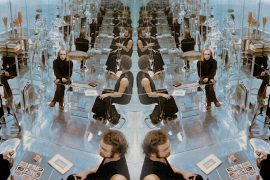
As I move forward with planning the creative work I’ve been commissioned to write for the Ambient Literature project, I find myself thinking about the affordances of the smartphone and how important this device has become to many of us, the multiple ways in which it is now a key piece of technology in our daily lives. For this project, I’m interested in the ways in which the smartphone has become a technology for reading.
I read on my phone all the time: I read social media feeds, I read journalism, I read academic papers, I read reports and analysis. But I don’t read a lot of long form prose on my phone. I remain fond of print books and have this rather pointless ‘rule’ of buying print when I think the book might be something I’ll want to keep — novels I’ll re-read, non-fiction I’ll want to refer to again (‘pointless’ because there’s no way of knowing in advance if I’ll want to keep a book on my shelves; as well as that, I re-read and refer to books by other people with about as much regularity as I re-read and refer to books by myself, i.e never* and, besides, I can find the text of the book online anyway).
This commission gives me an opportunity to think more about what forms of fiction might work best on the smartphone. E-books are convenient but unlovable, with their skeuomorphic devotion to pagination and print layout. Fine for an e-reader, but ugly and clunky on the phone. What type of story would best utilise the features of the smartphone, harness its computing power including its in-built sensors, in order to provide a reading experience that feels native to the device? Is there room for literary reading experiences** on the smartphone? If not, what does this mean for the future of literary reading?
Amy Spencer has outlined previous examples of works that engage smartphones in new ways here and these pieces provide starting points for thinking about the future of reading. At the same time, however, the relationship that we have with our phones is constantly changing and the habits we’ve developed have multiplied as new interactive and social paradigms have appeared. This is what I’ll be mulling over during the forthcoming year as I start to work in this new space, hopefully finding new ways to tell a good story.
—Kate Pullinger, @katepullinger
*Not true, but you see my point.
**You may ask what I mean by ‘literary reading experiences’. Stay tuned for a future post. Maybe.








Comments are closed.